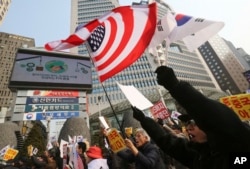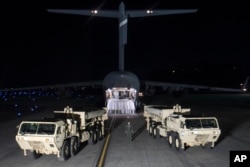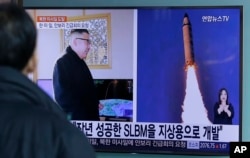Amid heightened tensions between the U.S. and China over deployment of a U.S. anti-missile system in South Korea, experts suggest the United States should again send a clear message during an expected summit next month that the U.S. action is not intended as aggressive.
The U.S.-South Korean decision to install the Terminal High Altitude Area Defense (THAAD) missile system on the Korean Peninsula came in July, following Pyongyang's missile tests last year. China has repeatedly condemned the move, insisting the system's radar would peer into its territory and survey its military, and now that components of the missile interceptor system are being installed, Beijing is reportedly bringing economic retaliation against Seoul over the missile interceptor.
Washington is stepping up diplomacy to try to bridge differences with China over the THAAD issue, but the two sides appear far from an agreement.
China's Foreign Minister Wang Yi reiterated disapproval of THAAD during a meeting last weekend in Beijing with U.S. Secretary of State Rex Tillerson, a Chinese Foreign Ministry spokesman said Wednesday. And Joseph Yun, the State Department's special representative for North Korea policy, told his South Korean counterpart, Kim Hong-kyun, that Tillerson spoke "very strongly" to the Chinese side to emphasize that THAAD is a defensive measure against potential North Korean missile launches.
"The secretary said in private meetings that retaliating against the defensive system, which the Chinese had done, was something that was uncalled for, and something of growing concern for us," the U.S. diplomat said Wednesday.
Clear signal needed
President Donald Trump is planning to host Chinese President Xi Jinping for a two-day summit next month, the first meeting between the two world leaders. Neither Washington nor Beijing has confirmed the summit at Trump's Mar-a-Lago estate, but news reports indicate the plans call for meetings April 6-7.
Despite concerns that the THAAD deployment could widen the rift in Washington-Beijing relations, Trump needs to send a clear signal to Xi that THAAD is "not an issue that is up for debate," said J. Berkshire Miller, a Tokyo-based international affairs fellow with the Council on Foreign Relations.
"THAAD is a crucial deployment, and I don't see the U.S. walking back from that one inch," Miller told VOA. "The U.S. should at least have a dialogue [with the Chinese], but at the same time, I think the Trump administration should be quite firm that this is not an issue that is up for debate."
Seeing THAAD as a "natural consequence" of an evolving threat from North Korea, Bonnie Glaser, a senior adviser for Asia at the Center for Strategic and International Studies (CSIS), told VOA that Washington should continue to tell Beijing "this system is not aimed at China ... and [China] will just have to live with this decision."
Douglas Paal, director of the Asia Program at the Carnegie Endowment for International Peace, said he would advise Trump to repeat former President Barack Obama's reassurances to China that THAAD is not an offensive weapon, but rather a defensive system designed to counter North Korea's missile launches.
The Trump administration "should offer what was offered ... during the Obama administration without success, which is briefings on the capabilities of THAAD, so as to give China some reassurance that the worst fears they have about it are misplaced," Paal told VOA.
'Nothing to discuss'
Some experts, like Walter Lohman, think there is "nothing to discuss" with China on THAAD, and that Beijing is overstepping its bounds, infringing on Seoul's sovereignty and national security.
Lohman, director of the Asian Studies Center at the Heritage Foundation, said Trump should stress to Xi that Beijing needs to be more assertive vis-a-vis its North Korean ally, if China does not want to see any more missile defense systems deployed in the region.
"There's a problem on the Chinese side with enforcement [of U.N. Security Council resolutions], and President Donald Trump can make that point," Lohman told VOA. "He can also make the point that if they're not more compliant, then Chinese companies are going to come under sanctions."
Some experts argue there are other reasons for China's opposition to THAAD than its claimed fear that the missile shield puts the nation's security at risk.
China's attempt to reverse the decision based on "unfounded" claims is due to its "political desires to dominate their region," Thomas Countryman told VOA this week. Countryman served as the U.S. assistant secretary of state for international security and nonproliferation during the Obama administration.
"There's no technical basis for it, and in conversations with Chinese diplomats, they've come very close to admitting that it is, for China, a political issue instead," Countryman said. "It's just patently unfair and hypocritical for China to say that it is the only country that has the right to a defensive system."
Lohman suggested that "the Chinese see some value to themselves — strategically — for North Korea to have this missile capability, and to have some sort of deterrent effect on the United States.
"So that's why they don't want the THAAD in there, because it dilutes that deterrent that their allies in North Korea have," he said.
Development proceeding
North Korea appears to be accelerating its nuclear and missile development. Most recently, it fired a missile from its east coast Wednesday, but that apparent weapons test was a failure.
The missile launch came a few days after Kim Jong Un's military tested a new high-thrust rocket engine that it claimed was a "great leap forward" in its rocket development.
The U.S. State Department responded to the latest rocket launch with a rebuke, saying that "further provocations are unacceptable" and that the U.S. was "prepared to use the full range of capabilities" at its disposal to defend itself and its allies from North Korean attacks.
"We call on the DPRK to refrain from provocative actions and inflammatory rhetoric that threaten international peace and stability, and to make the strategic choice to fulfill its international obligations and commitments and return to serious talks," a spokesperson for the State Department told VOA on Monday.
This report was produced in collaboration with VOA's Korean service.









